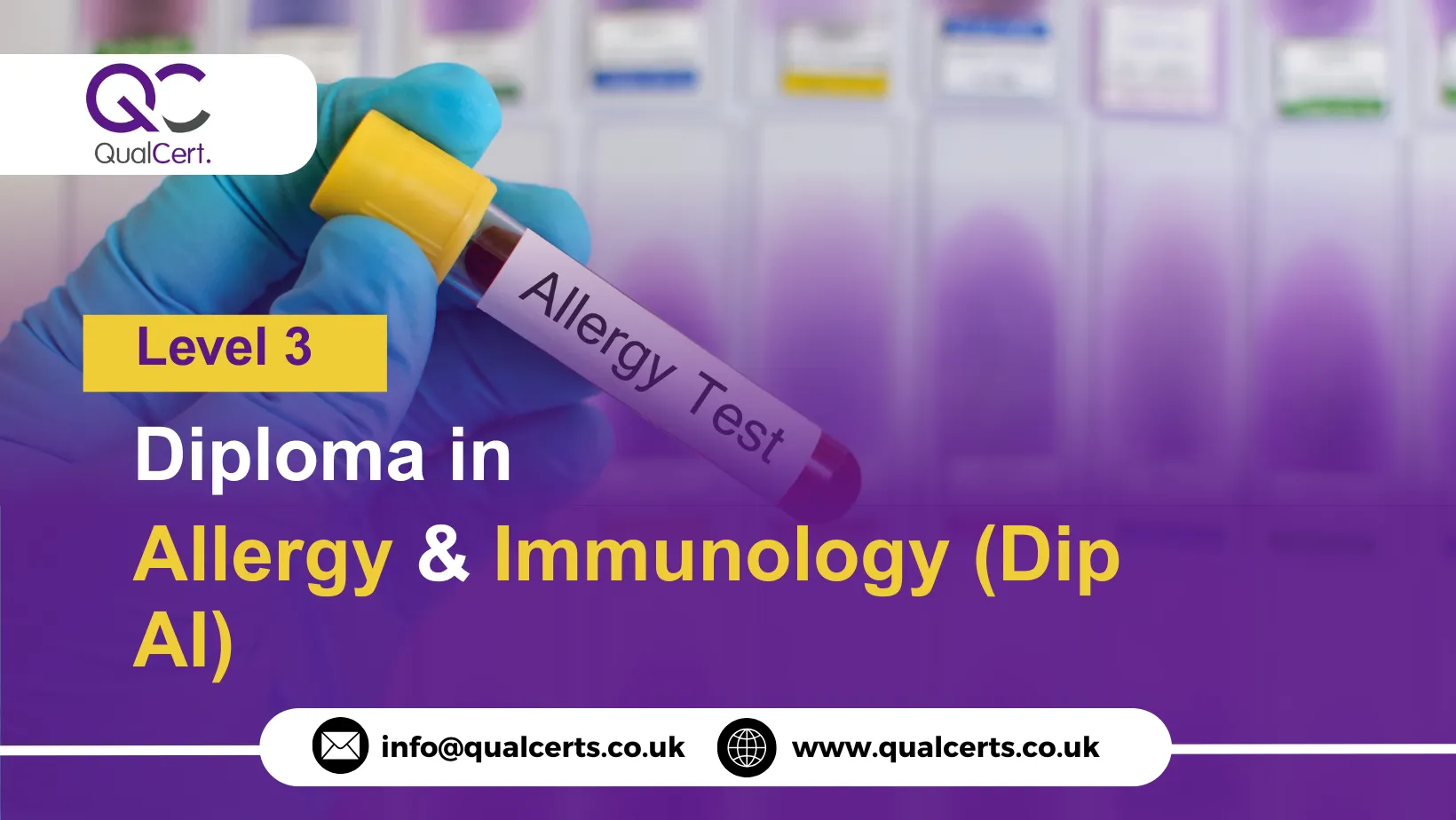The QualCert Level 3 Diploma in Allergy and Immunology (Dip AI) is a specialised qualification designed for healthcare professionals seeking advanced knowledge and skills in the diagnosis, management, and treatment of allergic and immunological disorders. Recognised in the UK and internationally, this diploma equips learners with the expertise to provide evidence-based, patient-centred care in clinical, community, and laboratory settings.
The Dip AI provides comprehensive training in the principles of allergy and immunology, covering the immune system, allergic reactions, diagnostic methods, clinical management, pharmacology, and preventive strategies. Participants will gain both theoretical knowledge and practical skills to assess patients, interpret test results, and implement personalised care plans.
The course emphasises ethical practice, patient safety, and evidence-based interventions, ensuring learners are prepared to manage the complex needs of patients with allergic and immunological conditions in line with UK professional standards.
The QualCert Level 3 Diploma in Allergy and Immunology equips healthcare professionals with the essential skills and knowledge to deliver high-quality, evidence-based care. Through a combination of theoretical learning and practical application, this diploma enables learners to make a meaningful impact on patient health and outcomes.
Course Contents of QualCert Level 3 Diploma in Allergy and Immunology (Dip AI):
The QualCert Level 3 Diploma in Allergy and Immunology (Dip AI), offers 60 Credits, requiring a Total Qualification Time (TQT) of 300 hours, including 210 Guided Learning Hours (GLH).
| Unit Ref# | Unit Title | Credit | GLH | TQT |
| QC27150-1 | Principles of Allergy and Immunology | 10 | 35 | 50 |
| QC27150-2 | Clinical Assessment and Diagnostic Techniques | 10 | 35 | 50 |
| QC27150-3 | Management of Allergic and Immunological Conditions | 10 | 35 | 50 |
| QC27150-4 | Pharmacology and Therapeutic Interventions | 10 | 35 | 50 |
| QC27150-5 | Preventive Strategies and Patient Education | 10 | 35 | 50 |
| QC27150-6 | Research, Evidence-Based Practice, and Professional Skills | 10 | 35 | 50 |
Entry Requirements for the QualCert Level 3 Diploma in Allergy and Immunology (Dip AI):
To enrol on the QualCert Level 3 Diploma in Allergy and Immunology (Dip AI), learners must meet the following entry requirements:
Minimum Age
- Applicants must be at least 18 years old at the time of enrolment
Educational Background
- A relevant healthcare, medical, or clinical qualification is required
- Equivalent qualifications demonstrating foundational knowledge in biology, health sciences, or related fields may also be considered
Experience
- Practical experience in healthcare, clinical, or laboratory settings is preferred but not mandatory
- Applicants without formal experience should demonstrate strong motivation and interest in allergy and immunology
Language Proficiency
- Proficiency in English is required for academic study and professional communication
- Applicants may need to provide evidence of English language competence, such as IELTS or equivalent, if English is not their first language
Learning Outcomes for the QualCert Level 3 Diploma in Allergy and Immunology (Dip AI):
Principles of Allergy and Immunology
- Understand the structure, function, and mechanisms of the human immune system
- Identify common allergic and immunological disorders
- Analyse immune responses and the underlying causes of allergies
- Apply foundational knowledge to clinical assessment and patient care
Clinical Assessment and Diagnostic Techniques
- Conduct comprehensive assessments for allergy and immunology conditions
- Apply diagnostic tools including laboratory tests and clinical evaluations
- Interpret test results accurately to inform clinical decisions
- Develop patient assessment plans based on evidence and best practice
Management of Allergic and Immunological Conditions
- Develop evidence-based treatment and management plans for allergic and immunological disorders
- Implement interventions tailored to individual patient needs
- Monitor patient progress and adjust strategies accordingly
- Evaluate outcomes to improve care quality and effectiveness
Pharmacology and Therapeutic Interventions
- Understand pharmacological treatments and immunotherapy approaches
- Apply therapeutic interventions safely and effectively
- Integrate pharmacological and non-pharmacological strategies for optimal patient care
- Manage treatment plans in line with professional standards
Preventive Strategies and Patient Education
- Advise patients on lifestyle modifications and risk reduction strategies
- Educate patients on managing and preventing allergic and immunological conditions
- Promote awareness of triggers, avoidance measures, and self-care strategies
- Support patients in long-term health and wellness management
Research, Evidence-Based Practice, and Professional Skills
- Apply evidence-based practice in clinical decision-making
- Conduct research using validated methodologies in allergy and immunology
- Demonstrate professional, ethical, and patient-centred behaviour
- Develop communication, leadership, and teamwork skills in multidisciplinary settings
The Course is idael for ;
- Nurses, clinicians, and healthcare practitioners specialising in allergy and immunology
- Laboratory technicians and healthcare professionals involved in immunological testing
- Individuals aiming to work in hospitals, clinics, community health, or research settings
- Professionals interested in improving patient outcomes through evidence-based allergy and immunology care
- Anyone pursuing advanced skills in the assessment, management, and treatment of allergic and immunological disorders
The Centre Requirements for QualCert Level 3 Diploma in Clinical Nutrition (Dip CN):
- Centres must be accredited by QualCert or an equivalent recognised awarding organisation
- Must have qualified teaching staff with relevant healthcare or immunology expertise and experience
- Adequate classroom and practical facilities for both theoretical and hands-on learning
- Access to clinical and laboratory resources for practical training and assessment
- Policies and procedures for learner support, assessment, and quality assurance in line with UK professional standards

